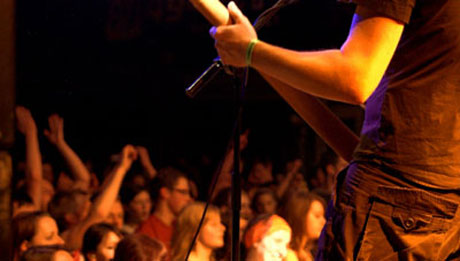(单词翻译:单击)
情景对话
Todd: So, usually, do people come up and talk to you after the show, or are people usually kind of shy and they don't know how to approach you?
托德:一般来说,演出结束以后人们是会过来和你们聊天,还是他们会害羞,不知道要如何靠近你们?
Eoin: Yeah, so that's another thing. I mean we have a CD stall and some people are very forward and they'll come and instantly like rush up and buy a CD but I think in Japan, especially it seems like people are kind of shyer about approaching you so giving out a questionnaire and asking people write it, it gives them an excuse to come up and talk to you anyway if they're interested later. So yeah, whenever we've given out questionnaires, it seems like we sell more CDs on those days.
约恩:是另一种情况。我们有一个出售CD的货摊,有些人会冲过来买CD,不过我认为在日本,人们要更害羞一些,会不好意思靠近,所以分发调查问卷让人们填写,会给感兴趣的人过来和我们说话的机会。我们分发调查问卷的时候,会卖出更多的CD。
Todd: Then you just actually pass this out to the audience?
托德:那你是就直接把调查问卷发给观众吗?
Eoin: Yeah. Normally there's not that huge a number of people there, maybe forty or fifty people.
约恩:对,通常不会有太多的观众,大概四五十人的。
Todd: Yeah.
托德:好。
Eoin: Maybe a few more. It depends on the night. So this is... what I'm describing here is for a gig that's sort of away from home, you know. We played a concert just recently in Oita where we live and that was more of an event that we organized so we pretty much knew most of the people who had come anyway. In that case we played for longer, didn't do the questionnaire thing and just went out drinking after the gig. It was a more relaxed event on the night and afterwards but of course preparing for it in advance required a lot more effort — making sure people came and calling other bands to come and play with us and that sort of side of things.
约恩:也可能会有更多的观众。这要取决于晚上的情况。我说的是那种离家很远的现场演出。最近我们刚刚在我们生活的大分市进行了表演,那更像是我们组织的一场活动,所以大部分来的人我们都认识。在这种情况下我们的表演时间会长一些,不用做调查问卷,表演结束以后可以去喝酒。这种活动要更放松一点,当然事前也要进行充足的准备,要确保有人来,还有请其他乐队和我们一起表演。
Todd: So do you have a fan base? A big fan base?
托德:你们有粉丝群吗?很大的粉丝群体?
Eoin: I wouldn't say it's massive but, yeah I guess when we play in Oita normally somewhere between, on a good day maybe 35, 40. On a bad day 15 to 20 people will come and see us.
约恩:我不能说我们的粉丝人很多,不过我想我们在大分市表演时,最多会有35到40个人来看。少的话可能有15到20个人来看表演。
Todd: Still, that's good.
托德:那也很不错了。
Eoin: But, I mean, that's more, you know, we have to pro-actively contact them and say "Hey, you wanna come and see the band?" It's not like we just put an advert in the paper and everyone turns up, unfortunately.
约恩:还有,我们要主动和他们接触,我们会说:“嘿,你想来看乐队演出吗?”不幸地是,并不是我们只要在报纸上发布广告,就会有人来看演出。
Todd: Well, hey, you know. Give it time.
托德:嘿,你知道,要慢慢来。

译文属可可原创,仅供学习交流使用,未经许可请勿转载
重点讲解
重点讲解:
1. give out 分发;散发;
例句:The teachergave outthe examination papers.
教师发了考卷。
2. pass out 分配;分发;
例句:The professor ispassing outthe course syllabus.
教授正在派发课程摘要。
3. depend on 取决(于);有赖(于);
例句:Quality standards selecteddepend onintended use of the water.
水质标准的选择取决于水的预定用途。
4. in advance 提前;事先;
例句:She suggested that they book the ticketin advance.
她建议他们预先定票。
5. make sure 一定要;设法保证;
例句:Make surethat nothing is left out of account.
一定要把一切情况都考虑到。
6. turn up (常指出其不意地或经长久等待后)出现,到来,露面;
例句:We arranged to meet at the cinema at 7.30, but he failed toturn up.
我们约定7点30分在电影院见面,但他没来。


